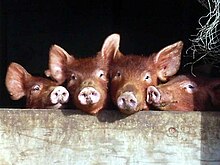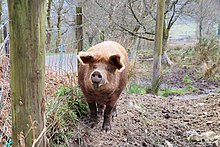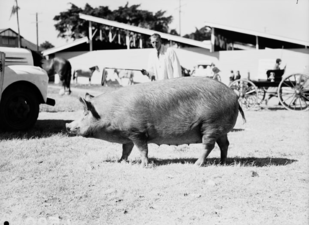Tamworth pig
 Tamworth piglets | |
| Conservation status | |
|---|---|
| Country of origin | United Kingdom |
| Standard | |
| Traits | |
| Weight | |
| Skin colour | flesh-colour |
| Hair | red-gold |
| |
The Tamworth is a British breed of domestic pig. It is the only red-coloured British pig.[4]: 700 Its origins are unknown, but it appears to have developed near the town of Tamworth in south-eastern Staffordshire, close to Warwickshire border.[4]: 700 It is one of seven British pig breeds listed by the Rare Breeds Survival Trust as 'priority', the highest level of concern of the trust.[5]
History

The origins of the Tamworth are not known. It appears to have originated shortly before or after 1800 near the town of Tamworth in south-eastern Staffordshire, close to Warwickshire border. There are many theories of the origin of its unusual red colouration: that it derived from a wild jungle pig (Sus scrofa cristatus) brought from India by Sir Francis Lawley; that it derived from Irish pigs known as 'Irish Grazers', brought to Drayton Manor in Drayton Bassett by Sir Robert Peel;[6] that Peel had not used these, but a boar brought from the West Indies; or that the colour was due to a West African Guinea Hog descended from pigs from Portugal, or to a red pig imported in about 1750 from Barbados.[4]: 700 The colour may have been fixed by selective breeding alone.[4]: 700
The Tamworth was recognised as a breed in 1865 and entered at the Royal Show in that year. A herd-book was started in 1885, and a breed society, the Tamworth Incorporated Pig Breeders Association, was formed in 1906.[4]: 700
Tamworths were imported into the United States by Thomas Bennett of Rossville, Illinois, in 1882.[7] Soon they entered Canada where they have also endured. Breed associations for Tamworth swine are active in the UK, the USA, and Canada. Farmers in each country much favour other pigs in quantity. From 1913 to mid-century, the breed reached peak numbers in Canada, reaching up to 10% of total swine. In Australia, the breed reached peak numbers of about 1000 in the mid-20th century.[8] In New Zealand there were five breeding sows in 2002; in 2021 it was listed as "priority" by the Rare Breeds Conservation Society of New Zealand.[9]
Characteristics

The Tamworth has a long snout, a slightly dished or concave profile, and prick ears.[10] The coat is long, fine and straight and of a ginger or red-gold colour, preferably without black hair; the skin is flesh-coloured and should carry no black spots.[10]
Tamworths are considered a medium-sized porcine breed; a full-grown boar ranges from 250 to 370 kg (550 to 820 lb) and a full-grown sow ranges from 200 to 300 kg (440 to 660 lb). The adult length ranges from 100 to 140 cm (39 to 55 in), and heights of about 50 to 65 cm (20 to 26 in) are common.[11] The curled adult tail is about 24 to 30 cm (9.4 to 12 in). These pigs have characteristically long necks and legs, deep sides, and narrow backs. Their ham structures are quite muscular and firm. The breed is known for having an excellent foot structure and a good skeletal system. Litter sizes are typically somewhat smaller than those of commercial breeds. Unacceptable features, according to breed aficionados, are: curly hair, a coarse mane, a turned-up nose, and dark spots on the coat.
Gallery
- At Mudchute Park and Farm on the Isle of Dogs
- Champion sow in Queensland, 1950s
- Sow, best of breed at The Last Royal Show, 2009
See also
References
- ^ Barbara Rischkowsky, Dafydd Pilling (editors) (2007). List of breeds documented in the Global Databank for Animal Genetic Resources, annex to The State of the World's Animal Genetic Resources for Food and Agriculture. Rome: Commission on Genetic Resources for Food and Agriculture, Food and Agriculture Organization of the United Nations. ISBN 9789251057629. Archived 23 June 2020.
- ^ Breed data sheet: Tamworth / United Kingdom of Great Britain and Northern Ireland (Pig). Domestic Animal Diversity Information System of the Food and Agriculture Organization of the United Nations. Accessed February 2023.
- ^ a b Tamworth. Kenilworth, Warwickshire: Rare Breeds Survival Trust. Accessed February 2023.
- ^ a b c d e Valerie Porter, Lawrence Alderson, Stephen J.G. Hall, D. Phillip Sponenberg (2016). Mason's World Encyclopedia of Livestock Breeds and Breeding (sixth edition). Wallingford: CABI. ISBN 9781780647944.
- ^ Watchlist 2022–23. Kenilworth, Warwickshire: Rare Breeds Survival Trust. Archived 28 September 2022.
- ^ Tamworth Pig. Canadian Farm Animal Genetic Resources Foundation. Archived 17 January 2015.
- ^ Breed Information – ALBC Conservation Priority List. American Livestock Breeds Conservancy. Archived 29 July 2012.
- ^ Australian Agriculture 1993, National Farmers Federation, Morescope Publishing (1993)
- ^ Tamworth Pigs: A Rare Breed of British Origin. Rare Breeds Conservation Society of New Zealand. Archived 20 April 2021.
- ^ a b The Tamworth. The British Pig Association. Archived 1 August 2017.
- ^ Aberdeenshire coastal countryside, Lumina technologies, Aberdeen Library Archives, July 2006
Further reading
- James AS Watson and James A More, Agriculture: the science and practice of British farming, 4th ed. revised and enlarged, Edinburgh, Oliver and Boyd (1937)
- Annette and Grant McFarlane, Pig keeping on a small scale, Kenthurst, NSW, Kangaroo Press (1996).
- J van Der Pol.., Today’s hog won’t work outdoors, Graze. (reproduced in Genesis vol.16, No.3, 2001)



